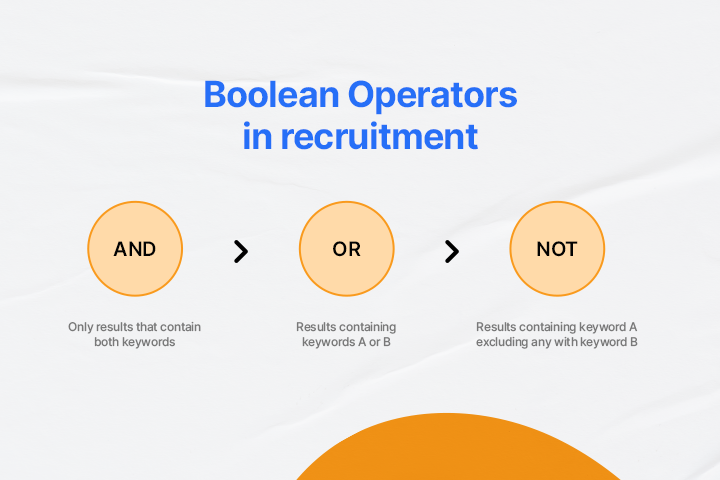One of the most powerful tools recruiters use to streamline the search process is Boolean search. Boolean operators allow recruiters to filter and refine their search results on job boards and social platforms, leading to more precise and effective candidate sourcing. However, as effective as Boolean search can be, it is not without its limitations. A newer, more advanced tool like Qureos can offer a better alternative to Boolean operators in many aspects.
What is Boolean Search in recruitment?
Boolean search refers to the use of Boolean operators (AND, OR, NOT) to combine or exclude keywords in search queries. Recruiters use this method to locate resumes, profiles, or job candidates on online job boards, LinkedIn, and other databases. By structuring searches with Boolean operators, recruiters can narrow the search results only to include candidates who meet specific criteria, such as skill set, experience, or location.
Why is Boolean Search useful for recruiting?
Boolean search is beneficial because it allows recruiters to create highly specific queries, saving time and effort by delivering only relevant results. According to a LinkedIn report, 87% of recruiters find Boolean search an essential tool for effectively narrowing down candidates. For example, if a recruiter is looking for a software developer with experience in Java and Python, they can search using the Boolean operator AND (e.g., “Java AND Python”).
This method significantly improves precision by avoiding the inclusion of irrelevant profiles that don’t meet the desired skill set. Additionally, recruiters using Boolean search report a 30% reduction in time spent reviewing unsuitable applications, highlighting its efficiency in the hiring process.
Examples of Boolean operators and their symbols?

How to Use Boolean Operators in Recruitment
To use Boolean search effectively in recruitment, it’s essential to have a clear idea of the ideal candidate’s qualifications, skills, and experiences. A recruiter can create combinations of search terms that capture these aspects. For instance, searching for a “Data Scientist AND (Python OR R)” will help identify candidates with expertise in either of these programming languages, narrowing down the results to the most relevant profiles.
Boolean Search vs. AI Recruitment
Boolean search has been a reliable tool for recruiters, enabling precise filtering of candidates using manual keyword-based queries. However, as recruitment challenges grow more complex, the limitations of Boolean search become apparent—it relies heavily on recruiter expertise, struggles with context understanding, and can be time-consuming to refine.
In contrast, AI recruitment platforms revolutionize sourcing by leveraging machine learning and natural language processing to analyze candidate profiles holistically. These tools eliminate the need for manual query construction, adapt dynamically to recruiter preferences, and deliver more accurate and diverse results. This paradigm shift highlights how AI is setting a new standard for efficiency and precision in recruitment.
What makes Qureos better than Boolean Operators?
Qureos offers an intelligent, intuitive alternative to Boolean operators by leveraging machine learning and natural language processing. Unlike Boolean search, which requires users to manually construct complex queries, Qureos understands the context and intent behind a recruiter’s search. This means that it can automatically suggest relevant keywords, job titles, or qualifications, making the search process much faster and more accurate.
Qureos goes beyond keyword matching by analyzing candidate profiles at a deeper level, considering factors such as experience, skills, and even cultural fit. This advanced level of analysis provides a more holistic approach to candidate sourcing, whereas Boolean search is typically limited to matching keywords and phrases.
Key Advantages of using AI Recruiment over Boolean Search
Advanced AI Matching
Qureos matches candidates not just on keywords but on the overall context and relevance of their profiles. This ensures more precise results by capturing nuances that Boolean search often misses.
Time Efficiency
Boolean search requires repeated refinements and manual adjustments, which can be tedious and time-consuming. Qureos streamlines this process, delivering accurate results with minimal effort. Its ability to source talent across 20+ languages also ensures seamless global recruitment.
Accurate Candidate Suggestions
Qureos leverages natural language processing to understand job descriptions and candidate profiles with exceptional accuracy. This capability helps overcome challenges such as variations in terminology or phrasing, which often lead Boolean search to miss relevant candidates.
Customizable and Adaptive Filters
While Boolean search relies on rigid, predefined queries, Qureos offers dynamic filters and personalized recommendations. This allows recruiters to refine their search with ease and adapt to changing requirements.
Conclusion
Boolean operators have been a staple of the recruiting process for years, providing recruiters with the ability to search for candidates based on specific terms and criteria. However, Qureos represents a significant leap forward in recruitment technology by offering AI-driven insights, faster candidate sourcing, and more accurate results. While Boolean search will continue to play a role in recruitment, Qureos is an essential tool for those seeking a smarter, more efficient way to find top talent.
.avif)



